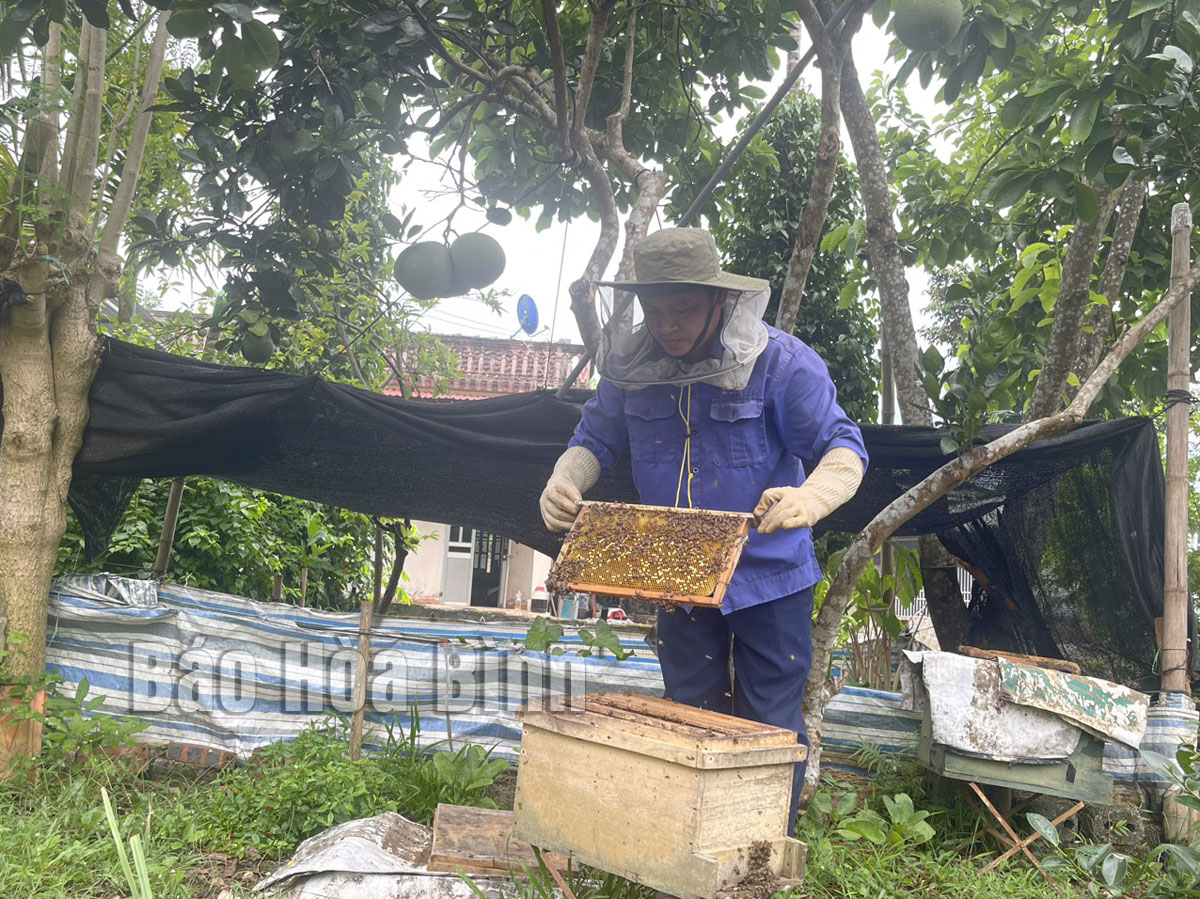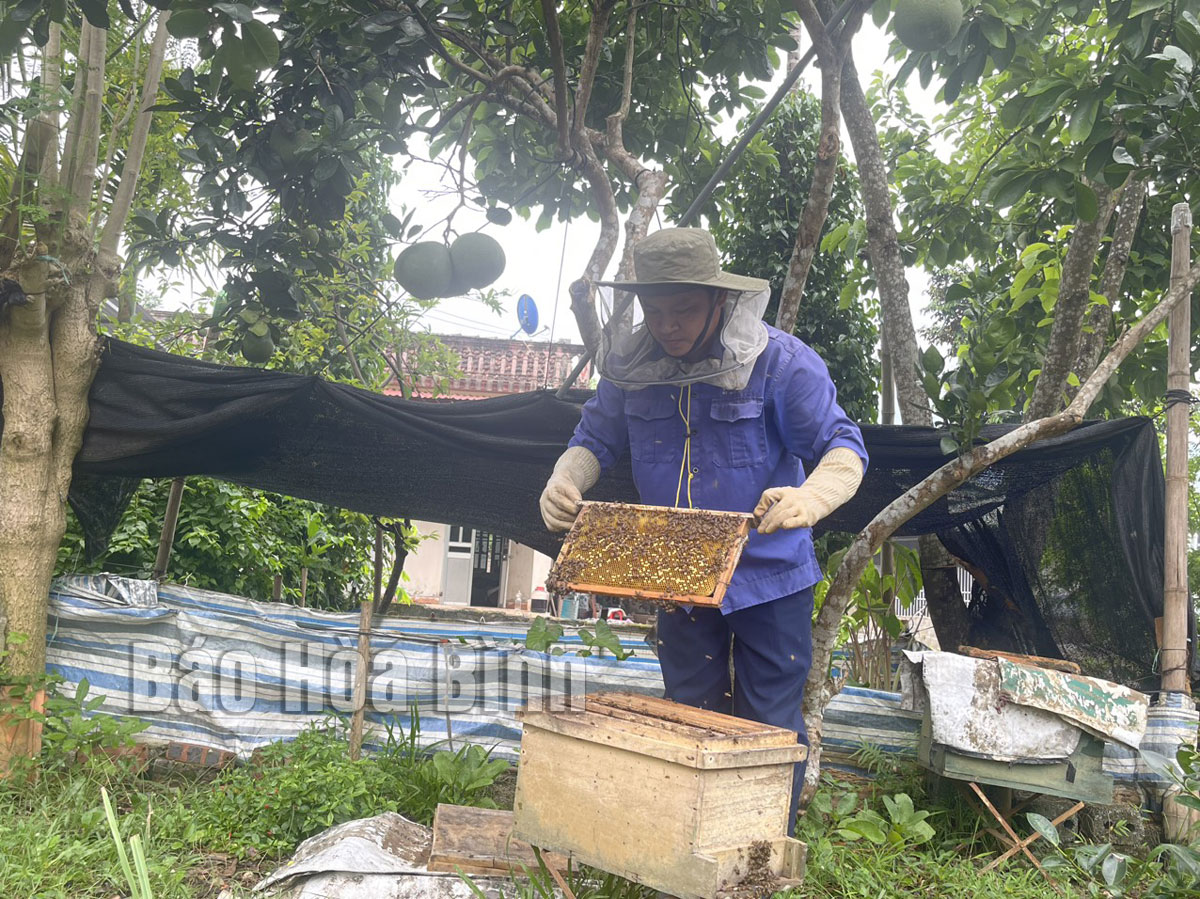
(HBO) - Implementing the One Commune One Product (OCOP) programme, Hung Thi commune in Lac Thuy district has stepped up the dissemination of information to encourage local people to actively respond to the programme, and creates favourable conditions for owners to build and develop their products based on local potential and advantages. Currently, the commune is completing a dossier to turn Hung Thi forest honey into the first 3-star OCOP product of the locality.

Pham Van Toan, Director of Pham An farm produce cooperative in Hung Thi commune inspects the process of beekeeping for honey of member households.
The Pham An farm produce cooperative has 25 member households, mainly engaging in agricultural production, of which, more than 10 have many years of experience in beekeeping for honey. They are raising more than 700 colonies of honey bees, with an average yield of 7 quintals to 1 tonne of honey each time.
Pham Van Toan, director of the cooperative, said realising the potential and possibility of developing forest honey in Hung Thi commune, the cooperative decided to invest in developing it into an OCOP product. Through the district's support in science and technology, the cooperative promulgated a common production process for member households requiring them to commit to ensuring the quality of forest honey and food safety. Currently, the cooperative has completed necessary procedures, and is submitting the product to the district for appraisal and evaluation. The district People's Committee has also supported the cooperative to complete the design, packaging, and traceability stamp in accordance with 3-star OCOP product standards.
In addition to forest honey, Hung Thi commune is building a plan to turn lemongrass essential oil into its second OCOP product.
Luong Van Dong, Chairman of the People's Committee of Hung Thi commune, said that determining the biggest goal of the OCOP programme is to awaken local advantages to create special products, in the implementation plan, the commune has selected products with potential for development and available advantages. Through the assessment, there are two products: forest honey and lemongrass essential oil, as more than 70% of the commune's agricultural land are hills, and the commune also has a club of skilled beekeepers, and more than 40 hectares of lemongrass plantation./.
According to data from the Hoa Binh Provincial Party Committee, the industrial production index for the first six months of 2025 is estimated to have increased by 20% compared to the same period last year. This marks the highest year-on-year growth rate for this period since 2020.
In the first six months of 2025, Hoa Binh province’s export turnover was estimated at 1.145 billion USD, marking an 18.11% increase compared to the same period in 2024. Import turnover was estimated at $ 804 million, a 17.15% increase, which helped the province maintain a positive trade balance.
The lives of the ethnic minority farmers in Tan Lac district have gradually improved thanks to the new directions in agricultural production. This is a testament to the collective strength fostered through the professional associations and groups implemented by various levels of the district’s Farmers’ Union.
With the motto the "product quality comes first,” after nearly one year of establishment and operation, Muong village’s Clean Food Agricultural and Commercial Cooperative, located in Cau Hamlet, Hung Son Commune (Kim Boi district), has launched reputable, high-quality agricultural products to the market that are well-received by consumers. The products such as Muong village’s pork sausage, salt-cured chicken, and salt-cured pork hocks have gradually carved out a place in the market and they are on the path to obtaining the OCOP certification.
In the past, the phrase "bumper harvest, rock-bottom prices" was a familiar refrain for Vietnamese farmers engaged in fragmented, small-scale agriculture. But today, a new spirit is emerging across rural areas of Hoa Binh province - one of collaboration, organisation, and collective economic models that provide a stable foundation for production.
Maintaining growing area codes and packing facility codes in accordance with regulations is a mandatory requirement for agricultural products to be eligible for export. Recently, the Department of Agriculture and Environment of Hoa Binh province has intensified technical supervision of designated farming areas and packing facilities to safeguard the "green passport" that enables its products to access international markets.



